'He's going to be a head coach one day': Why Alex Atkins could help bring Florida State football back
Understanding what makes Alex Atkins a special college football coach begins with knowing that Florida State recently entrusted him with a rare opportunity.
Atkins added offensive coordinator to his job title last December while remaining as the offensive line coach. Only three other programs in the Power Five – Texas (Kyle Flood), USC (Josh Henson) and Arizona (Brennan Carroll) – have solo offensive coordinators who are also their team’s lone offensive line coach.
Carroll, the son of legendary coach Pete Carroll, doesn’t know Atkins personally but insisted that the Seminoles should benefit from promoting him. The advantages that can come with this distinct role, Carroll explained, are fairly straightforward.
“If you can coach a room with 15 to 20 guys as an O-line coach, doubling that to 40 or 50, that shouldn’t be a big transition,” Carroll said.
FSU football's most improved player: Florida State football coach Mike Norvell raves about running back Lawrance Toafili
More FSU football: Three notes from Inside Seminole Football, Norvell reveals practice plans
ACC Network news: Florida State grad Taylor Tannebaum explains how alma mater helped her land at ACC Network
At least not as much as the offensive coordinators who climbed the ranks coaching another position group with just a few players, like quarterback or tight end. Those two positions also are coached by an overwhelming majority of Power Five offensive coordinators.
Not to mention offensive line coaches already tend to be heavily involved with the running game and protection schemes. And Atkins brings one season of experience as an offensive coordinator/offensive line coach, working under Will Healy in that role at Charlotte in 2019.
“A lot of O-line coaches feel like they are coordinators anyway,” Atkins said. “Most coordinators will tell you that they have to work hand in hand with the offensive line coach. It’s basically a 50-50 split of what they can and can’t do, and a lot of offensive line coaches are relied on as run-game coordinators and protection coordinators.”
It’s easier to buy into this concept at FSU when knowing more about Atkins. Like how his previous coaching jobs prepared him for this opportunity. And how he builds relationships and recruits better than anyone on the Seminole coaching staff.
And how he has already significantly improved the outlook of a traditionally porous offensive line.
When FSU named Mike Norvell as head coach before the 2020 season, he inherited an offensive line that ranked among the nation’s worst. As the offensive line coach, Atkins has helped Norvell turn the group into more of a serviceable unit.
The Seminoles had finished outside of the top 90 teams in the country in sacks allowed for four straight seasons, including 125th in 2019. They also ranked outside of the top 90 in rushing offense in 2018 (No. 125) and 2019 (No. 93). Only San Jose State (2.07) had a lower yards per carry average than FSU (2.07) in 2018.
In each of their two seasons with Atkins, the Seminoles still struggled with allowing sacks. Their rushing offense, though, came in at No. 31 (2020) and No. 52 (2021) nationally while averaging more than 4.75 yards per carry in both seasons.
It’s still a work in progress, but there has been noticeable improvement. And to return to its rich history of winning, FSU will need Atkins to keep delivering.
“I believe in coach Atkins. He is one of the best leaders of men that I’ve been around,” Norvell said. “That shows up in his willingness to invest in relationships. His willingness to take time and to be who he genuinely is.
“That drew me to him when I hired him and brought him to Florida State. He inspires others around him to be the best versions of themselves. When you can bring that element into a program, it’s going to make an incredible impact.
“Obviously he’s phenomenal with the schematic part of the game. But leading the offense, it takes it all. And he has done a great job with that.”
In a story published last month, ESPN’s Adam Rittenberg included Atkins, 38 and Black, in his list of 45 minority coaches under 45 to watch for future Division I head coaching jobs. Ask some of the people who have been around Atkins, and they are equally as bullish about his future with the Seminoles and beyond.
“He’s going to be a head coach one day,” said Tulane head coach Willie Fritz, who previously worked with Atkins for five seasons. “I really believe that.”
Closer look at Mike Norvell's personal life: Inside the family dynamics that make Mike Norvell a football force on the field
Humble beginnings shaped Atkins’ coaching ambitions
When interviewing candidates for his offensive line coach vacancies, Fritz likes to ask the same, simple question.
Can you teach me how to snap a football?
As the head coach for Georgia Southern, Fritz interviewed Atkins for his offensive line coach opening before the 2014 season. The way Atkins answered Fritz’s patented question caught his attention.
So much so that Atkins – who had no prior experience as an FBS positions coach – landed a job offer from Fritz later that day.
“I had no intention of hiring him,” Fritz said. “He came in and went on for 10 minutes about how to snap a football. He got into the wind blowing, certain plays, the direction you are going and how he had problems with this one guy and tweaked it this way.
“I have never played center. And I’ve never been an offensive line coach. But he said it in very simple terms.
“I have interviewed a lot of guys about snapping a football. They go about two minutes and say the same stuff that I would have said. I just thought, ‘This guy is pretty darn good.’"
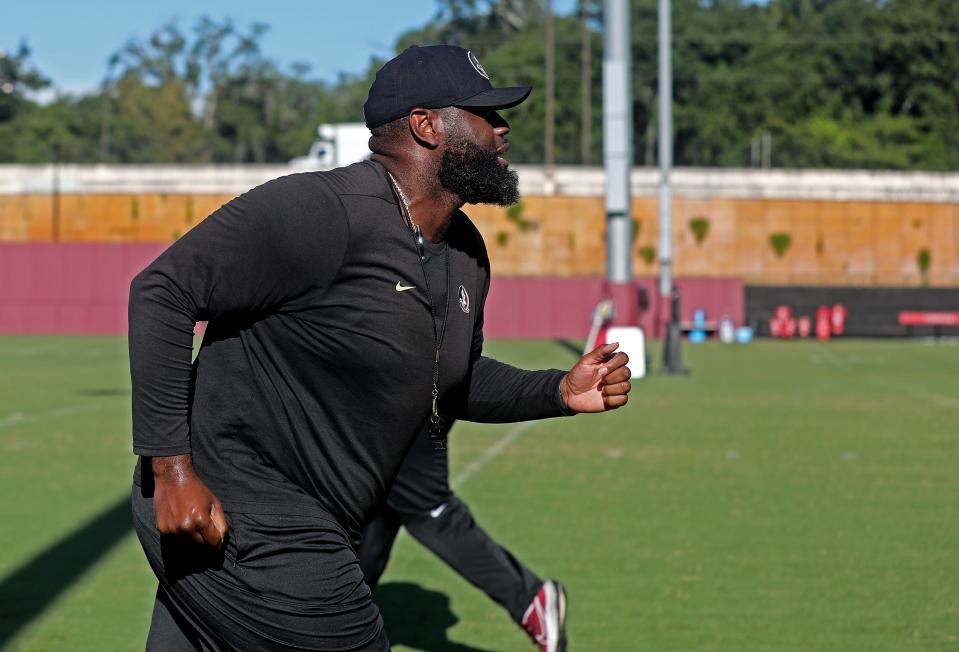
Atkins’ response showed how much he looks to grow and apply what he has absorbed from each of his coaching stops. Because Atkins didn’t go full monologue mode just to impress Fritz. To Atkins, snapping a football genuinely didn’t seem like a rudimentary concept that can be explained in a concise manner.
Not after his time as the offensive line coach for Fulton (Miss.) Itawamba Community College (2010-11) and FCS Chattanooga (2012-13).
“I had to study a lot, because there weren’t many centers wanting to come play for me at the time,” Atkins said. “Not anybody was trying to come to Fulton, Mississippi to play at Itawamba. Not many guys were coming to UTC at the time just wanting to play center.
“You had to make them. You had to recruit the tight ends or guys who didn’t know how to snap the football.”
The irony behind Atkins’ meticulous approach is that he initially decided against coaching football. After Atkins completed his playing career as a four-year starter at offensive guard for UT Martin, the Chicago native planned to return to Illinois to be a state trooper.
But Jason Simpson, Atkins’ head coach with the Skyhawks, convinced him to pursue a different path. Simpson hired Atkins as a graduate assistant in 2007 and elevated him to tight ends coach the following season. Then Atkins took another graduate assistant job, at Marshall in 2009, before landing at Itawamba, Chattanooga and eventually Georgia Southern (2014-15).
The Georgia Southern job represented the first time Atkins broke through to the FBS ranks as a positions coach. Atkins balked at the notion, though, that his career progression should be viewed as an ascent. He has learned too much from coaches like Simpson to consider them beneath him in the college football hierarchy.
“I love how we say ranks, because there are some phenomenal football coaches at all levels,” Atkins said. “That was the best thing for me – I was fortunate to be around great football coaches.”
Prepping to be an offensive coordinator
The first time Atkins called plays didn’t come at Charlotte in 2019, his first season as an offensive coordinator.
It actually came in Tulane’s 41-24 victory over Louisiana Lafayette in the 2018 Cure Bowl.
Atkins had shown enough in his time with Fritz to earn that opportunity. In their two seasons together at Georgia Southern, the Eagles led the nation in rushing yards per game. The Green Wave ranked No. 118 nationally in rushing in 2015 before finishing in the top 30 in each of Atkins’ three seasons with the program.
Those who have been around Atkins describe him as a coach who wants to tailor the offense around the personnel he has and what each situation dictates. Not around a predetermined system or game plan. And in Atkins’ first game as a play caller, he chose to lean heavily on the running game.
As a result, Tulane turned 68 carries into 337 yards and four touchdowns.
“The moment wasn’t too big for him,” Fritz said. “He’s not afraid of pressure. He’s a smart guy who is able to handle it and understand it. There were a couple times throughout the game that he thought maybe he should have done something different.
“And then the next time he had that opportunity, he did it.”
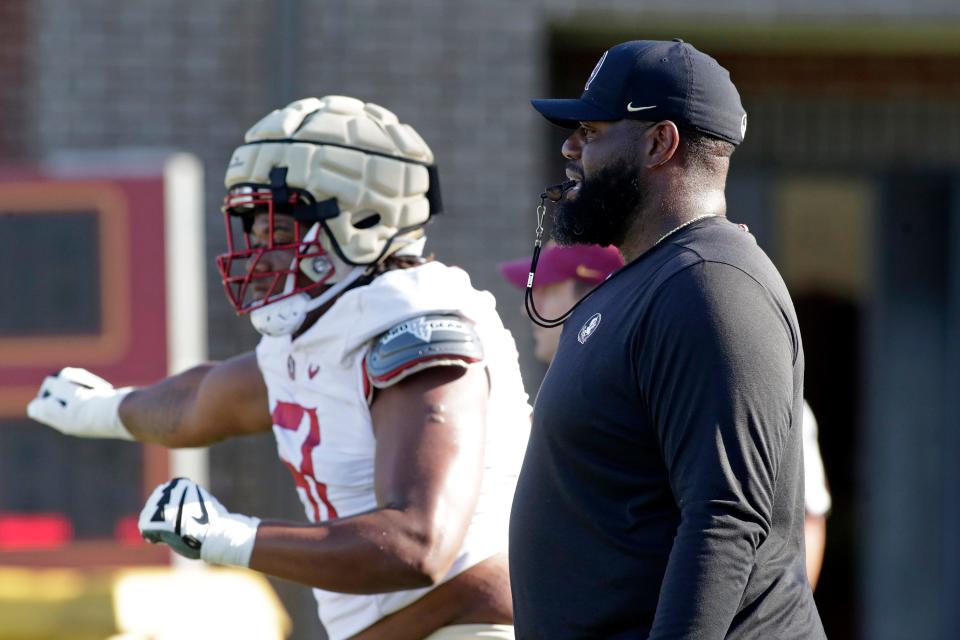
With the Green Wave, Atkins held a few different titles. Assistant head coach. Run-game coordinator. Offensive line coach. But he was never their offensive coordinator.
Healy gave Atkins that title at Charlotte in 2019. In Atkins’ lone season there, the 49ers reached their first bowl game in program history via the Bahamas Bowl. They also finished the season with seven wins while leading the AAC in rushing.
“I had to step back and learn how different positions operate and the tempo they operate,” said Atkins on his adjustment to being an offensive coordinator. “The X’s and O’s are one thing, drawing on the board and watching the film. Pretty much all football coaches can engage with that.
“But actually building relationships at multiple positions and understanding how they work, how they think, how to react and how to make sure they get to their goals so they are operating as a team and unit.
“It was more of the investing that I learned.”
That experience left Atkins hungry to improve as an offensive coordinator. Which partly explains why Atkins agreed to be FSU’s offensive line coach ahead of the 2020 season. No, Atkins wouldn’t be the coordinator. But he understood that he could learn a lot from the offensive-minded Norvell.
At Tulane, Atkins admired Norvell from afar as his University of Memphis teams carved up practically every defense in the AAC. And Norvell knew of Atkins from when the Green Wave recorded 318 rushing yards in their 40-24 win over the Tigers in 2018.
Seminole defensive coordinator Adam Fuller, who served the same role at Chattanooga during Atkins’ two seasons there, also put in a good word for him.
“I had to really step back and say, ‘If I really wanted to coordinate and run an offense, I need to learn from somebody who did it better than I did,’” Atkins said. “That’s what made me connected to Mike Norvell. And then when I got here, I thought he was not only a great offensive mind but an outstanding head coach.
“He’s probably one of the few (coaches) I saw who knows as much defense as he knows. That really elevated my game too, because he studies defense just as much as he studies offense. What they look at and how they perceive things.
“Because when you grow up in an offensive system, all you think about is how we perceive things. You never turn that tape around and see that from the other end. But he has.
“So that gives him a different perspective on the total picture of how he builds his offense.”
A full minute of #FSU coach Alex Atkins working with the offensive line. pic.twitter.com/AoSFGuDlOI
— Carter Karels (@CarterKarels) August 8, 2022
‘A great relationship builder’
Cameron Clark wanted to transfer.
The move would have made sense for the former Charlotte left tackle.
Pro Football Focus graded Clark as its best Conference USA offensive lineman in the 2018 season. So a lot of the nation’s top programs likely would have wanted him for his final collegiate season. And had Clark transferred to a major Power Five school, he could have elevated his NFL Draft profile even more.
Clark also knew the 49ers were bringing in their sixth offensive line coach since he joined the program in 2015. But once Clark met with that coach, Atkins, his perspective quickly changed.
And not because Atkins wanted to fluff him up as a way to entice him to stay.
“In that conversation, it was brutal honesty,” Clark said. “He’s telling me about my stance. He’s telling me about my pass protection. He would always mess with me, because he would be like, ‘Scouts always ask me, ‘Can you handle the bull rush?’ And he would say, ‘I don’t know, we are going to have to see.’ He’s always trying to find the next way to motivate you.”
That conversation left such a lasting impression on Clark that he decided against transferring. In just one year with Atkins, Clark took another step forward and put together a stellar final season. Then the New York Jets selected him in the fourth round of the 2020 NFL Draft.
The relationship Atkins forged with Clark didn’t end there, either. He is still one of Clark’s biggest mentors. Clark even trekked to Tallahassee to train with Atkins during the summer before last season.
“Coach Atkins could have been in Alaska, and I would have gone to Alaska to get the work in with him,” Clark said. “That work is priceless. One on one with a guy like that?
“I was always coached by him in a group setting. But when you get him one on one, it’s scary. Just how detailed he is. When you can get his attention on just you, it was almost hard to digest everything that I was learning.”
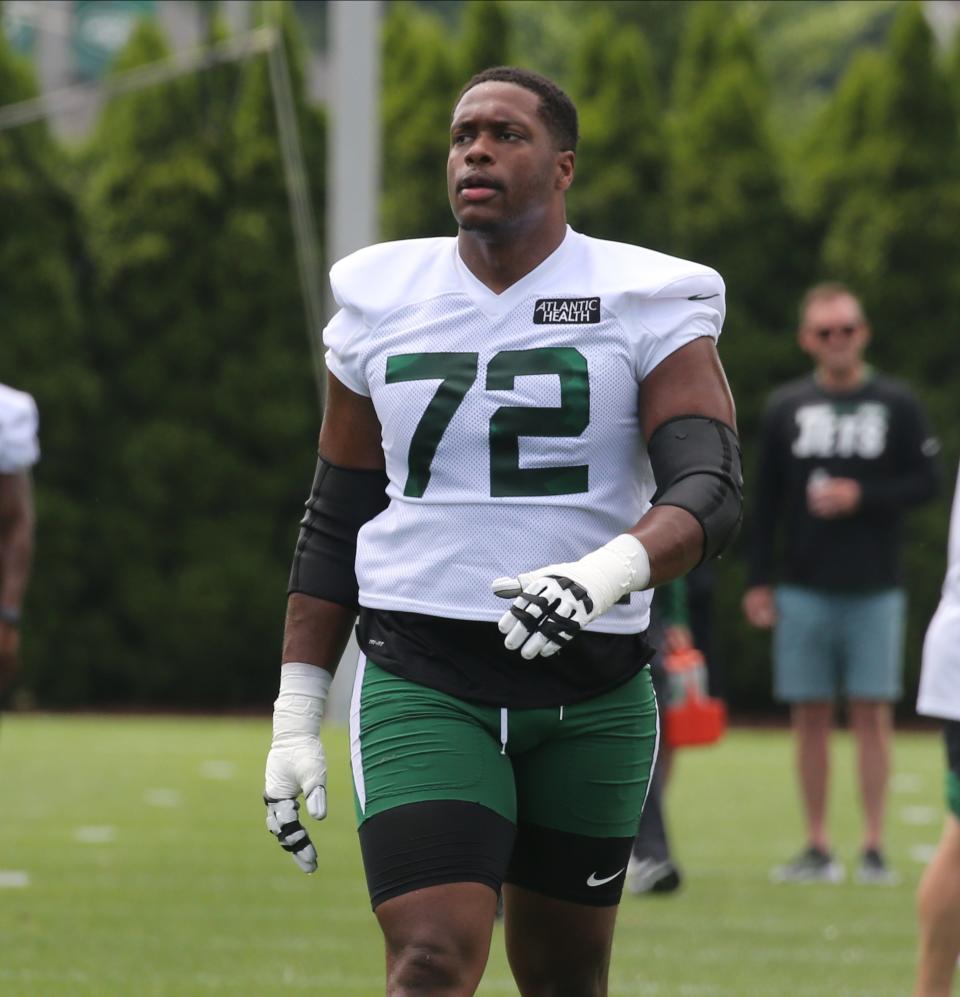
Atkins had nothing to gain from that training session. Not only was Atkins not getting paid, but also Clark wasn’t even one of his current players. And Clark remembers Atkins being busy with youth camps during that time.
Those factors didn’t deter Atkins, though.
“It’s not about, ‘Hey, what do I owe you?’ Or, ‘What did you do for me?’ I have a genuine relationship with him,” Atkins said. “And I try to build that with all of my players.”
Clark is no outlier, either.
“He still is in contact with a bunch of the guys who played for us at Georgia Southern and also here at Tulane,” Fritz said. “He talks to these guys all of the time. I pride myself on keeping up with the guys I’ve coached throughout my career, and Alex is the same way.
“I will talk with somebody, and they will say, ‘Yeah, I talked with coach Atkins last week.’ And that kid played for Alex four years ago. That usually doesn’t happen much with assistants. …
“He’s a great relationship builder.”
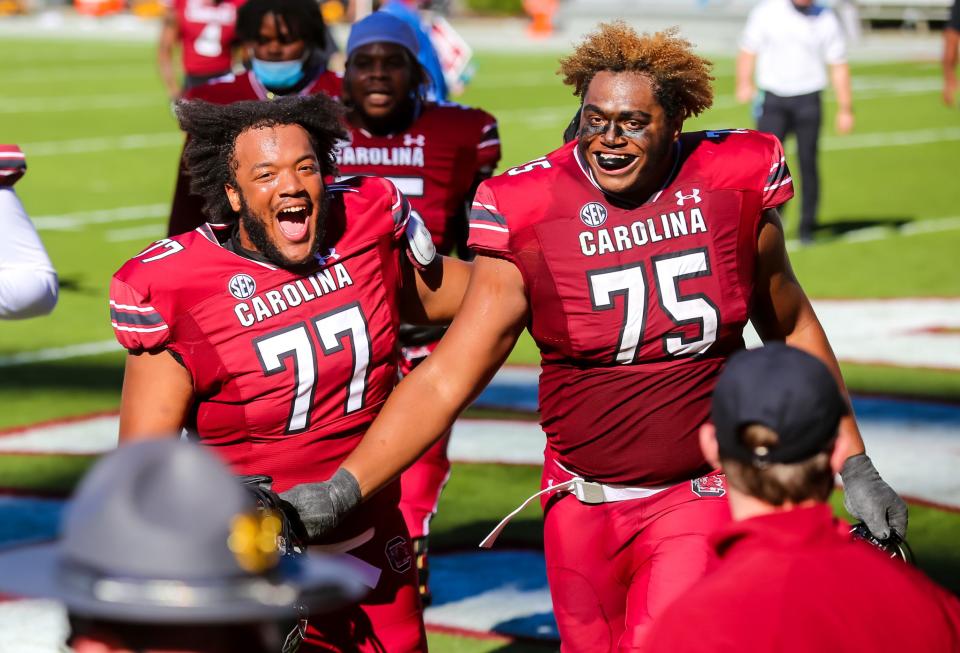
Atkins using transfer portal to improve FSU’s offensive line
Brutally honest.
It’s how Clark and so many other offensive linemen who have played for Atkins defined his coaching style. They describe him as a totally different person off the field, though. FSU left tackle Robert Scott Jr. explained the contrast perfectly.
“When he’s on the field, he’s not your friend,” Scott said. “But when you are not on the field, that’s your dog.”
That dynamic also resonates with a lot of the players Atkins pursues in the transfer portal and out of high school. Just ask Dillan Gibbons, the Notre Dame transfer who came to FSU last season and immediately started at left guard.
“In our first two or three conversations, he was only telling me facts,” Gibbons said. “He wasn’t promising everything in the world. He wasn’t harassing me. I had coaches – even from programs here in the state of Florida – that were calling my mom at work. Finding my sister’s number. It was absolutely insane.
“But coach Atkins was brutally honest with me about my development, who I was, my body type and what I put on film at Notre Dame. That’s what I appreciated. He wasn’t trying to put my head up. He wasn’t promising me everything in the world. And he told me that I had an opportunity.
“I realized I had that opportunity when I checked out Florida State’s film. And everything he said was all lined up. There hasn’t been a single word that’s come out of coach Atkins’ mouth that hasn’t come true, whether it’s on or off the field.”
Atkins helped the Seminole offensive line improve after adding offensive guard transfers Devontay Love-Taylor (Florida International) and Gibbons. They both earned All-ACC honorable mention recognition last season.
Still, the position group only had so many reliable backups. FSU's depth concerns were accentuated even further last season after three starters – center Maurice Smith, Love-Taylor and Scott – missed multiple games for various reasons.
The Seminoles could only rely on seven offensive linemen as starters but played a staggering 21 different combinations across 12 games. Brady Scott started at least one game at left tackle, left guard and right guard. Robert Scott started at both offensive tackle positions. So did Darius Washington, and he also briefly played center.
Left guard was FSU’s only offensive line position that had the same starter – Gibbons – for more than nine games.
“For the other four guys on our offensive line, we had guys play four to five positions last year,” Gibbons said. “They were bouncing all over the place. It really depended on who was healthy per game.”
In hopes of preventing similar problems from occurring in the future, the Seminoles heavily prioritized the offensive line this offseason and added 10 to the unit. Six of those 10 were high school recruits in the 2022 class. The remaining four were transfers in Bless Harris (Lamar), D’Mitri Emmanuel (Charlotte), Jazston Turnetine (South Carolina) and Kayden Lyles (Wisconsin).
Harris has exceeded expectations the most from that group and projects to be FSU’s starting right tackle this season. Emmanuel, who played for Atkins in 2019, has held his own after entering preseason camp as one of the favorites to start at right guard.
Turnetine likely won’t start, but he brings valuable depth and experience at both offensive tackle positions. He started seven games at left tackle for the Gamecocks last season. The Seminoles expected Lyles to push Smith for the starting center job, but he suffered a season-ending injury earlier this month.
Whether FSU’s offensive line has the necessary talent and depth remains to be seen. It’s undeniable, though, that the group dramatically improved this offseason. The second- and third-teams have been much more competitive in practice this offseason compared to recent years.
“We fixed that,” Norvell said. “You look at the number of guys who had to play early in their career, and the number of combinations that showed up through injury, and the depth issues that have shown up, being able to bring in some transfers, being able to bring in some really, really talented high school recruits, it sets up for a great fall ahead for us.”
FSU offensive line transfers: New Florida State lineman Jazston Turnetine buying into Alex Atkins' detailed coaching style
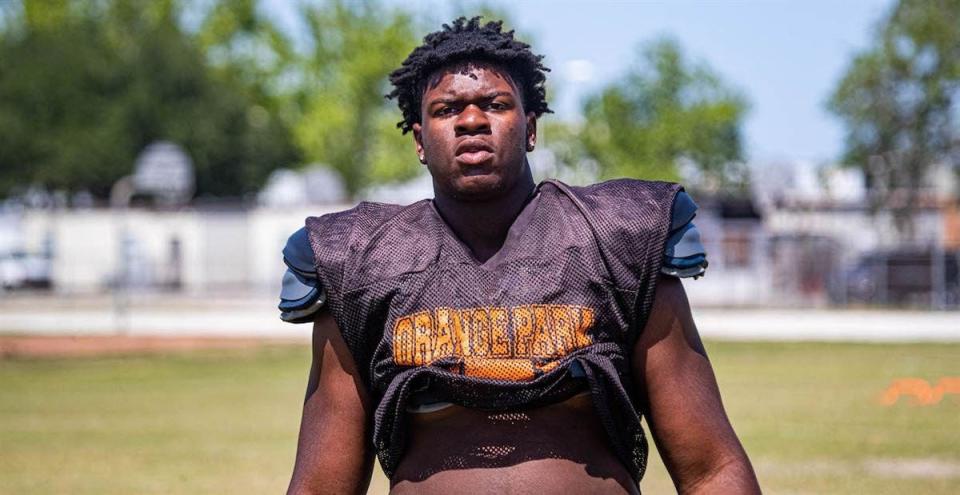
Ace recruiter
Roderick Kearney had just completed his official visit to Florida.
That’s when Kearney, a four-star offensive lineman in the 2023 recruiting class, suddenly felt confident enough to choose his future school. So within an hour of the late-June recruiting trip ending, the Orange Park product took to social media to announce his verbal commitment.
To Florida State.
The timing of Kearney’s decision certainly sent shockwaves through the recruiting world. His reasoning is even more noteworthy.
“After what I saw, it didn’t feel genuine,” said Kearney about his Florida visit. “Everything felt like a show being put on. And they were also telling me the same things that they were telling other kids. How is that going to help me if you are telling everybody else what you are telling me? That’s not going to help me in my future. Every kid is not the same.
“You’ve got to have a different plan for me when I come to the school. They didn’t do that. They kept saying the same thing they were saying to somebody else. I didn’t really respect that.
“They also talked down on a lot of schools. I didn’t really respect that. They are great coaches. But I just felt like that’s not recruiting, talking down on a lot of coaches. They grind the same way y’all grind. They work the same way y’all work to get where they are at.
“But to talk down on those coaches is not very respectful.”
The Gator coaching staff supposedly talked down about the Seminoles. About Atkins. About Norvell being on the perceptual hot seat. But their negative recruiting tactics didn't work on Kearney, who always gravitated toward Atkins.
The relationship Atkins built with Kearney proved to be too strong for Florida to overcome – a recurring theme for Atkins as a recruiter.
“He opened my eyes to seeing real versus fake,” Kearney said.
Less than a month later, FSU landed a pledge from another highly coveted four-star offensive lineman in Lucas Simmons. Per 247Sports, the Clearwater Academy International product would be the highest-ranked offensive tackle (No. 60 overall) to sign with the Seminoles since Landon Dickerson (No. 17) in the 2016 class.
Andrew Ivins, 247Sports’ Southeast recruiting analyst, called the commitments from Kearney and Simmons FSU’s two biggest recruiting wins under Norvell.
“He takes a unique approach with things,” said Ivins about Atkins. “He’s all about relationships. In this NIL Era, relationships are still king for some kids. It’s a testament to his ability as a recruiter.”
Atkins’ ability as a recruiter has especially blossomed since the last recruiting cycle. 247Sports ranked every ACC coach by what they accomplished in the 2022 class, and Atkins finished No. 3. He currently comes in as its No. 7 ACC recruiter in the 2023 class.
Assuming their 2023 class holds, the Seminoles will sign multiple offensive linemen rated four stars or higher in back-to-back cycles for the first time since 2006-07. It would end a tough streak, which has been defined by FSU only having three offensive linemen selected in the top three rounds of the NFL Draft since 2008.
Before Atkins’ arrival, the Seminoles desperately needed to improve their offensive line recruiting. With his recruiting approach, Atkins could complete the rebuilding project of FSU’s offensive line soon.
“He gets to know you,” Kearney said. “He gets to know your background. He’s not about recruiting. He doesn’t recruit. When I say recruiting, it’s trying to sell them or see if they are good at football.
“He will actually go into your history, your family background. Everybody has a different background. He learns about you. Learns about your family. Learns about your struggles.
“Everybody has different backgrounds. You can’t tell a person with a certain background the same thing as somebody else with a different background. That’s not how it works.
"You have to get to know that person. Get to know their story. So you can possibly help them out. Or even help them change the way they live.
“A lot of coaches don’t do that. They just get to know that player. Not the person. They get to know the player, their skill level, what they will do for them money wise. It’s not all about that.”
More FSU football recruiting: Florida State football beats Kentucky for 2023 defensive back Kenton Kirkland
Destined for more
Fritz recounted a time Atkins showed he had the makings of a future head coach.
On one particular Martin Luther King Jr. Day, Fritz asked Atkins if he wanted to speak about the subject to their players. Atkins, who wrote papers on Dr. King during college, relished the opportunity.
“He got up in front of the squad, went for about a half-hour and was really good,” Fritz said. “He did an excellent job. That was something that really impressed me.”
Atkins remembered his presentation well.
“I talked about (civil rights activist) Ralph Abernathy,” Atkins said. “And I talked about people who influenced Martin Luther King. Because right now, everybody wants to be a leader and an influencer. The people that we follow were followers at one point.
“We were teaching these young men that whatever you want to be, find somebody like that and follow them and learn from them. And then when you are ready to step out there, you can step out there.”
Step out there like Atkins has.
That’s one way the lesson resonated with Fritz. Because his belief in Atkins has only grown since he offered him the Georgia Southern job. And Atkins’ ascent to FSU offensive coordinator only continued to increase Fritz’s confidence in him.
But Fritz is not alone in his belief. And sometime soon, the college football world could be buying stock in Atkins too.
“It’s extremely inspiring,” Clark said. “Coach Atkins could be yellow or purple. It’s the way that he carries himself. It’s very refreshing in the coaching world whether he was Black, white or anything.
“But the fact that he is a Black man who grew up in the inner city, became an offensive line coach, took the hard way, did the JUCO route, did the FCS – coach Atkins has excelled in every aspect of life.
“The main thing you respect about the man is, he’s the exact same every single day. It gets no better than that. A lot of these athletes that they are recruiting and the guys that are coming on campus are guys who don’t have those father figures.
“I’m 100% sure that any parent who has a child being recruited by Florida State wants their son to be like coach Atkins. Or to be around a man of that high character and value.”
Reach Carter Karels at ckarels@gannett.com or follow him on Twitter @CarterKarels. You can follow our coverage on Facebook (NoleSports) and Instagram (tlhnolesports).
No one covers the ‘Noles like the Tallahassee Democrat. Subscribe using the link at the top of the page and never miss a moment.
This article originally appeared on Tallahassee Democrat: FSU coach Alex Atkins brings promise as first-year offensive coordinator
